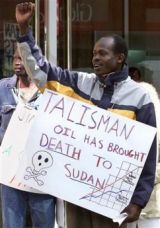Rights group sues Talisman Energy for gencide in southern Sudan
Nov 20, 2005 (NEW YORK) — For the people of Sudan, a case slowly moving through the courts holds great potential – a lawsuit that claims a Canadian company aided in genocide in its pursuit of oil.

But winning relief in a court half a world away will depend on how many people will be able to join in the lawsuit.
A federal judge recently limited the scope of the 2001 lawsuit brought by the Presbyterian Church of Sudan against Calgary, Alberta-based Talisman Energy Inc. in U.S. District Court in Manhattan by refusing to grant class-action status.
The 2nd U.S. Circuit Court of Appeals will decide by the end of this year whether to consider the class-action issue before the case goes to trial in January 2007.
The plaintiffs say class-action status is crucial to set the stage for a potentially large payout to Sudanese victims and to set a precedent for U.S. courts to aid suffering people worldwide who cannot find relief in their own courts. The church brought the case in the U.S. because the American courts are often the traditional route for such genocide cases.
Without it, “thousands of victims will be effectively denied any opportunity to pursue legal redress for acts of genocide, crimes against humanity and war crimes,” said Beth Van Schaack, assistant professor at the Santa Clara University School of Law. She submitted court papers on behalf of human rights groups and activists asking the appeals court to hear the issue.
The lawsuit alleges that Talisman, Canada’s biggest independent oil and gas exploration and production company, joined the Sudanese government in ethnic cleansing, killings, war crimes, property confiscation, enslavement, kidnapping and rape.
The plaintiffs allege Talisman supplied the Sudanese military with money, logistics, fuel, vehicles and accommodations as Sudan sought to depopulate 142 villages near oil fields by attacking them with bombers and helicopter gunships from 1999 through 2002. The plaintiffs – victims of aerial attacks – say Talisman aided genocide, war crimes and crimes against humanity.
Talisman did not respond to requests seeking comment, but company lawyers adamantly denied the allegations in court papers.
The attacks came amid a two-decade civil war pitting the government, led by Arab Muslims who dominate the north, against rebels fighting for greater autonomy and a greater share of the country’s wealth in the mainly black Christian and animist south. The conflict is blamed for more than 2 million deaths, primarily from war-induced famine and disease.
In a Sept. 20 ruling, U.S. District Judge Denise Cote rejected the class certification request, saying the proposed class is not sufficiently cohesive. She noted that at least 142 separate incidents involved in the suit occurred over more than four years in a territory of many hundreds of square miles.
She said Talisman will try to prove that government aerial attacks were directed at members of rebel armed forces hiding in or near some of the villages in question. She said the purpose of each attack will need to be resolved and a class action suit “will devolve into at least 142 trials addressing the circumstances of each attack.”
In a telephone interview, Van Schaack said winning class-action status for the case might in the future “force companies to think twice before they let the host government provide security or workers who might be subject to forced labor.”
Van Schaack said victims of genocide are left with nowhere else to turn if U.S. courts force them to seek justice in the country where they are oppressed.
Among groups Van Schaack represents in the case are the Center for Constitutional Rights, a nonprofit organization that has litigated significant international human rights cases for 25 years, and the Allard K. Lowenstein International Human Rights Clinic at Yale Law School which conducts research for international tribunals.
Carey R. D’Avino, a lawyer for the plaintiffs, said in court papers that denial of class certification “may sound the `death knell’ for 95 percent of class members,” or tens of thousands of people. “This bell tolls most chillingly for all human rights victims against whom the district court’s published decision, albeit unintentionally, imposes a new and unjustified procedural barrier.”
In court papers filed before Cote ruled, lawyers for Talisman urged her not to certify a class.
“The truth is that a class action proceeding in a United States court is the wrong mechanism to untangle the human tragedy of a decades-long civil war in Sudan,” the lawyers wrote.
Talisman also said a suggestion by plaintiffs that tens of thousands of class members could travel to Kenya for videotaped depositions was impractical.
The company in court documents said the plaintiffs “falsely assert” that Talisman upgraded airstrips at two locations for “security” purposes when they actually had “nothing to do with accommodating military activity.”
“Plaintiffs similarly paint a grossly misleading portrait that the government of Sudan’s use of the airstrips for offensive purposes was routine, and that Talisman Energy knew and gave its approval for the government of Sudan to carry out attacks on civilians,” the company said.
(AP/ST)
